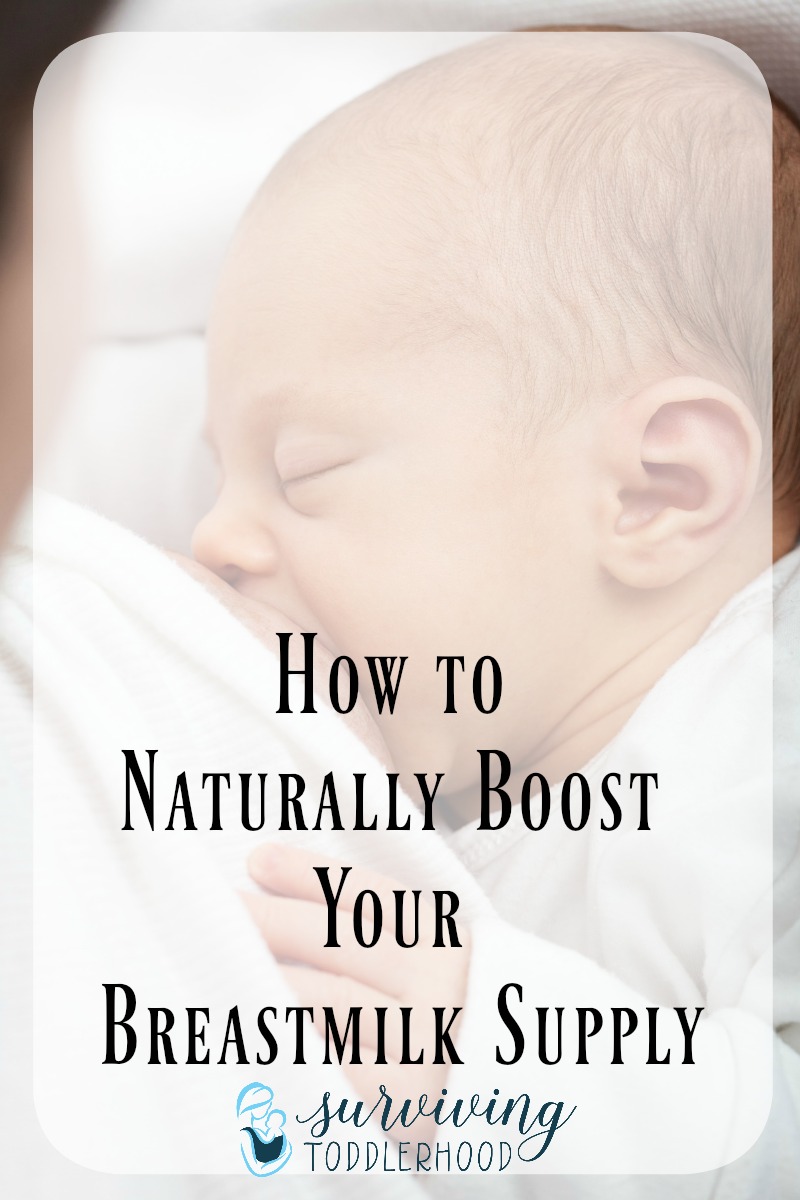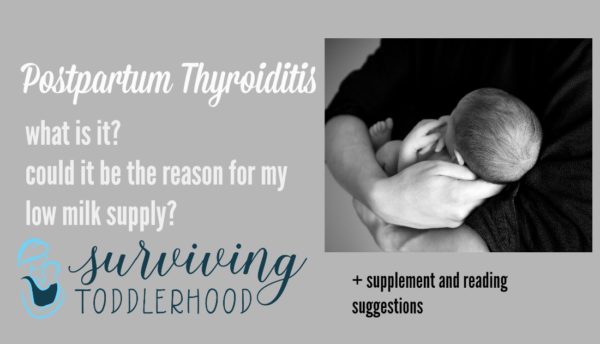{Have you been struggling with your breastmilk supply? Do you need to boost your supply for that weekend getaway with your husband? Here are some ways that you can naturally boost your breastmilk supply, shared by Rebekah of Hargraves Home and Hearth.
How to Naturally Boost Breastmilk Supply
There is nothing quite so distressing for a breastfeeding mama than the thought that her milk supply might not be big enough to meet the needs of her baby or that her milk supply might be decreasing. So, today, to help equip all you breastfeeding mamas out there, I want to share with you some of the very best ways to naturally boost breastmilk supply.
Before we get into that, however, I want to quickly touch on the fact that there may not be a true problem with your milk supply at all. Sadly, many mamas are led to believe that their milk supply must not be sufficient if any of these signs are present:
~baby is fussy
~baby wants to nurse all the time
~baby latches and unlatches over and over in the span of one feeding
~your breasts no longer feel engorged
In all actuality, these are not true signs of a low milk supply at all. Most often, these are signs that baby is simply going through a growth spurt, is distracted by other things, or just has other needs which need to be met at the time instead. In the case of no longer feeling engorged, this is a normal and expected development. When you first begin producing milk after your baby is born, you body produces more than your baby actually needs, then learns during the first 6 weeks how much your own unique baby takes in on a regular basis, and then by about 6 weeks postpartum, regulates to simply meet baby’s exact needs. The result is a reduction in the feelings of engorgement and a supply that is just right for baby – no longer an oversupply, as is normal at first. The only surefire sign that you are dealing with the problem of a low milk supply is if you notice a decrease in the number of wet diapers your baby is having each day and he is therefore no longer producing the number of wet diapers he should be for the age he is. For more on this, check out this helpful article from KellyMom.
Ok, so let’s say you actually have noticed a marked decrease in the number of wet diapers baby is producing each day and you therefore have reason to believe your milk supply is decreasing. What can you do? Well, thankfully, you have several great options at your disposal which we will now get into below.
{Affiliate links are included in this post. To see the full disclosure, click here.}

Daily Practices to Increase Milk Supply
Your first option to increase milk supply is to add these practices to your daily life for a bit to see if they will help.
- Nurse more often
Breastfeeding is all about supply and demand. The more demand there is, the more your body will be signaled to produce more milk. So, if you are dealing with a decreased milk supply, the number one best thing you can do is to simply increase feedings. Nurse as often as you can around the clock. Your baby will get more milk this way, anyway, and your body will be repeatedly told to make more, so it’s truly a win-win! Even if at some point you want to add a certain food or supplement into your diet to try to increase milk supply, as well, always be sure you are still also increasing your nursing sessions at the same time. While you are nursing around the clock for a time, also increase the amount of times you are holding baby directly skin-to-skin. For example, strip baby down to just a diaper, go without a shirt yourself, and hold baby skin-to-skin. Amazingly, this will also signal your body to boost your milk supply. It’s pretty neat!
- Pump
Another good option is to employ the help of a breast pump. Now, breast pumps are not nearly as efficient at extracting milk as babies themselves are, but pumping in addition to breastfeeding will signal your body to produce more milk, as it, again, is an increase in demand.
Do you feel like your #breastmilk supply is low? Use these tips to increase your milk supply, naturally! #breastfeeding #crunchymom #naturalremedies Click To TweetFoods to Increase Milk Supply
Your second option to increase your milk supply is to go the route of adding certain foods to your diet which are known for causing your body to make more milk. These include,
Eating a lot of oatmeal in general will help to increase your milk supply, but some folks believe that steel cut oats specifically will do the best job of boosting your supply.
- Lactation Cookies
Lactation Cookies are simply cookies which contain those foods and supplements known for boosting milk supply, such as flax seeds, oatmeal, brewer’s yeast, etc. A fantastic lactation cookie recipe can be found here.
Herbal and other Supplements to Increase Milk Supply
Your third option to increase milk supply is to begin taking a natural supplement known for increasing milk production. These include,
Fenugreek has been used, with success, for decades to boost milk supply, but it does not work for everyone. In addition to not working for all breastfeeding moms, there are also some other issues which sometimes go along with taking fenugreek and these include causing gas in mama and baby, disrupting the absorption of some vitamins and minerals, and working against certain medications, such as anticoagulants, when taken at the same time. So, before taking a lot of fenugreek in hopes of boosting your supply, I would first try some other options or at least discuss this option with a lactation consultant to see if it might be right for you.
- Brewer’s Yeast
My grandmother swears by brewer’s yeast for increasing milk supply. She took it back when she was breastfeeding and with good results. {Gluten free mommas, please be aware that Brewer’s Yeast is NOT gluten free.}
- Mama’s Milk Tea
A Mama’s Milk Tea is a tea containing many of the herbs known for increasing milk production, such as fennel seed and fenugreek. A great one can be found at this link from the Bulk Herb Store.
If you are wanting to begin taking a supplement to boost milk production, I would first and foremost recommend alfalfa. It is incredibly gentle on both mama and baby, is not known for possibly causing gas issues as fenugreek is, and works like a charm! In fact, it is what farmers regularly give to cows to increase their milk production. It is also high in various important vitamins and minerals. One word of caution, however: if, like me, you have a blood clotting disorder where your blood has a tendency to clot too much, alfalfa is likely not for you, because it is high in vitamin K (so high, in fact, that my midwife recommends ladies take it during their final weeks of pregnancy to help avoid a possible hemorrhage!). But other than for those folks with blood clotting problems, alfalfa would be the perfect first choice for supplementation. Just be sure you are buying it organic, as otherwise, it is one of the highest sprayed crops out there.
Remember to Stay Hydrated
While you are trying various foods or supplements, another important thing to remember while nursing is just to stay hydrated. Be sure to drink enough water (some folks suggest drinking 8oz. of water each time you nurse, though that may be a little much, considering you don’t want to drink an overabundance of water, either, as doing so can decrease the production of the hormones required for milk production, and therefore end up working against you). Drinking red raspberry leaf tea or mama’s milk tea can be another great way to insure you are staying hydrated as well as getting lots of good vitamins and minerals into your body, which is definitely important as a breastfeeding mama.
Relax
And, finally, Mama, do your best to just relax. Stress can work against you in many ways as a breastfeeding mom. So, as you are working to increase your supply, remember to also take a deep breath, relax, listen to calming music, spend time in the Word, whatever you need to do to cut down on your stress. It’ll be ok! You have so many options for increasing milk production. Just rest in that knowledge and in the knowledge that you are doing a great job of caring for your baby’s needs.
Scroll down for more posts you may like.
Rebekah Hargraves is a wife, mama of two kiddos 2 and under, home business owner, and blogger residing in TN. Her passion is to bless fellow Christian women through her writings on her website, Hargraves Home and Hearth, which exists to edify, equip, and encourage women in their every day life, for their journey of Biblical womanhood. You can also find Rebekah on Instagram, Twitter, and Facebook.
Instagram – @rebekahhargraves
Twitter – @hhomeandhearth
Facebook- Hargraves Home and Hearth
YOU MAY ALSO LIKE:




This is a great list for all breastfeeding mamas out there! I currently am not one as my children are older, however it is a great resource if I have more babies 😉 Thank you!! <3
I’m so glad! Thank you so much! 🙂
Filing this one away for this coming spring/summer! So far I haven’t had supply issues, but I could feel that I had less the last go round. Thanks for sharing!!! <3
Yay!! I hope it proves helpful to you! Congrats on your new baby on the way!! 🙂
So interesting. Wish I knew these things in my stage of nursing!
Oatmeal was my life while I was still heavily nursing! That and the occasional glass of Mother’s Milk.
With having to go egg and dairy free for James right now, oatmeal has become my daily breakfast. I don’t think he’s complaining!! haha I definitely have a larger supply this time around than I even did with my daughter, and this seems to be the main difference.
Quite a comprehensive list. I think the best is to just nurse more often or pump. My mom always says: the more you express, the more will come out.
So true! It usually works wonders to just up that demand.
I was producing barely one to 2 oz of breast milk and baby was hungry. I tried supplementing but was refusing formula. A friend suggested a lactation tea, to boost my production. It was, Healthy nursing tea that really helped and I started producing 5oz in each session that was enough for my baby.
I’m so glad that you found something that works for you, Madison! The tea works really well for me too, although I know others who say that it didn’t do much. it is so interesting to me, how or bodies all use the same things differently. Thanks for coming over, I hope that you come back sometime!
Initially my breast produces good amount of milk but now the amount decreases ( i started to give formula milk to my baby but and its reduces the breastfeeding might be the reason of decrease in milk production )
can anyone give me advice hiw to increase breastmilk again i wanna give breastfeed to my son who is 11 weeks old now
Hi Roshni, sorry for the delay in response. I would suggest is to increase your nursing sessions again. If you feel like you aren’t able to do that quite yet, start pumping each time your son takes a bottle of formula, probably for 20 minutes on each side. Then as you see that your supply is increasing you will be able to cut out one formula feeding at a time. Also, I highly, highly suggest finding a lactation consultant who is trained in these kinds of things. Maybe you even have some friends who might be able to help you out?
Besides pumping and finding a lactation consultant, I would just point you back to all the suggestions above. These are natural ways to increase your milk supply and you may have good luck with them. Feel free to respond with any other questions, just remember that I am not a doctor or medical professional. 🙂
Great ideas! My little one nursed all the time as a newborn because he was tongue tied and lip tied and wasn’t getting much! Once he had surgery on both of these, he was able to be more content!
Love this! I would add to make sure that you are consuming adequate calories as well. Blessed thistle, borage, red raspberry, comfrey (dried leaves), and nettle are also good for milk production (Wise Woman’s Herbal For the Childbearing Year has a recipe for a tea using those, and she shares more about how they work to help promote lactation, as well as a list of other suggestions that I have found helpful).
I’m grateful I have never had this problem but I know it can be rather common. Sharing on pinterest!